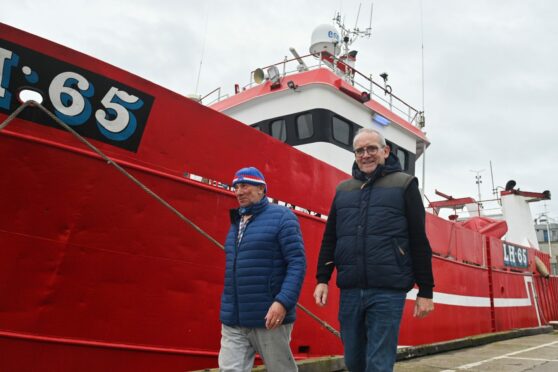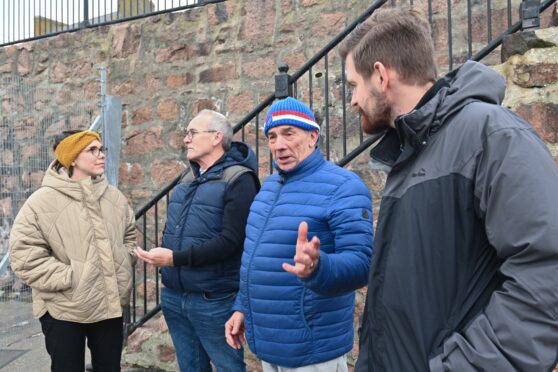Unlike most industries, the most immediate climate threat facing Scotland’s fishermen is not the pressing need to reduce their carbon emissions.
Instead, they say they are facing an increasing battle against red tape. The restrictions being put in place by people who know little about the reality of modern fishing in Scotland.
And if it continues, it could put an end to Scotland’s reputation as one of the most important fishing nations the world has ever seen.
‘Peterhead’s biggest threat is people who know nothing about fishing’
It’s mid-afternoon in Peterhead and there are a couple of boats bobbing about in the harbour.
A few years back this port would have been tightly packed with boats jostling for space, says Kenny Coull.
Kenny is fisheries policy officer at the Scottish White Fish Producers Association (SWFPA).
“It’s changed a lot in the last five or 10 years that’s for sure,” he said, his hood flapping in the roaring wind.
.@PhilippaGerrard interviewed two fishermen in Peterhead about the industry's relationship with climate change, past and present. Now off to find a charger in Ellon and file some articles! #ClimateRoadTrip pic.twitter.com/4TT5zlZEct
— Kieran Beattie (@KNBeattie) October 23, 2021
The climate crisis is definitely on the radar here. Though Kenny jokes that he wouldn’t mind if it were a few degrees warmer
“Strangely enough the immediate threat is not emissions or CO2,” he says, but the threat from organisations like ENGOs (environmental non-governmental organizations) and community groups.
“They are opportunistically using the situation with the COP26 coming up as a means of delivering their longstanding aims which are really not in the interest of the industry.”
He means many of the proposed measures these organisations are pushing for will make little to no impact on fuel emissions or fish stocks.
They include proposals to ban mobile fishing gear and introduce a three-mile “no fishing zone” around Scotland’s coastline.
“We’ve always had this,” Kenny said.
He references a recent WWF, RSBP and Marine Conservation Society report on “climate smart” fisheries.
He says no fishing industry experts were consulted.
“Other people seem to know best for our industry.”
Modernising an ageing fleet
In the meantime, fishermen themselves have been slowly making inroads on their carbon footprint.
Old boats are being retired and replaced with new vessels. These incorporate high tech improvements to hull and propulsion design. And also ultra-fuel efficient engines to create less drag and more power. They also use less fuel.
Instead of belching out fumes while sitting in the harbour, most boats are now hooked up to shore-based power units when in port.
And perhaps most significantly, Scotland’s mobile fleet has has reduced by 62% in the last 25 years. That has considerably reduced industry emissions.
But although this may sound positive for the planet, it’s not such good news for communities like Peterhead, the centre of Scotland’s white fishing industry.
The huge volume of small boats have been replaced with just a few, much larger and more efficient ships, explains John Buchan, a Peterhead fisherman of 45 years.
They outcompete the traditional lone fisherman.
“You can see the dead harbours around the coast; Buckie, Macduff, Lossiemouth, Burghead, Wick. All these used to be fishing towns.
“Now the fishing industry is almost non-existent.
“So yes maybe the big ships use a touch less diesel per ton of catch. But at the expense of local communities.”
Taking stock of the climate vs quota challenge
The fishermen have been here before.
Ever since Britain joined the EU in 1973, fishermen across the country say there has been a slow but steady erosion of fishing rights. Not to mention increasingly strict EU quotas. Quotas which many believe don’t reflect the reality of north sea fishing grounds.
“The trouble is that they measured the fish stocks down south and decided there was hardly any fish so the quotas had to reduce,” said Kenny.
“But what had really happened was – and this was partly because of warming waters due to climate change – that the cod had just moved up the coast and are much more prevalent here than ever before.”
Touchdoon in the Blue Toon! Away to speak to members of the fishing industry to discuss how climate change and how Scotland adapts to it will affect life here. #ClimateRoadTrip pic.twitter.com/fD9j2W31cR
— Kieran Beattie (@KNBeattie) October 23, 2021
Despite particularly healthy cod and hake stocks locally, north-east fisherman are unable to catch them in Scottish waters. They must travel vast distances using more fuel to work around the quotas.
But even the increasing financial and environmental cost of diesel cannot compete with the anxiety of climate crisis red tape.
That could spell the end of fishing in Peterhead for good. According to the industry.
Fishing for a sustainable future at COP26
It’s clear there is no easy way to get Scotland’s fishing fleet and its related industries to net-zero by 2045.
But Kenny, John and others around the country will be following COP26 with interest.
“We will absolutely be looking at COP26,” Kenny said.
“There will be several fishing groups present at the talks looking after the interests of Scotland’s fisheries.”
There is something, however, important he hopes that policy makers will remember. The fishermen.
“We are not dealing here with one big businesses which can reinvent itself,” he said. “We are dealing with individual businesses and individual families.”
“It is key that we do not demonise an industry whose CO2 emissions amount to less than 0.8% of the national total.”
For the fisherman with salt running through their veins, their entire future rests on sustainability.
They will be watching for real, meaningful action from people who understand the seas. Not men in suits who enjoy their caviar with a silver spoon.

